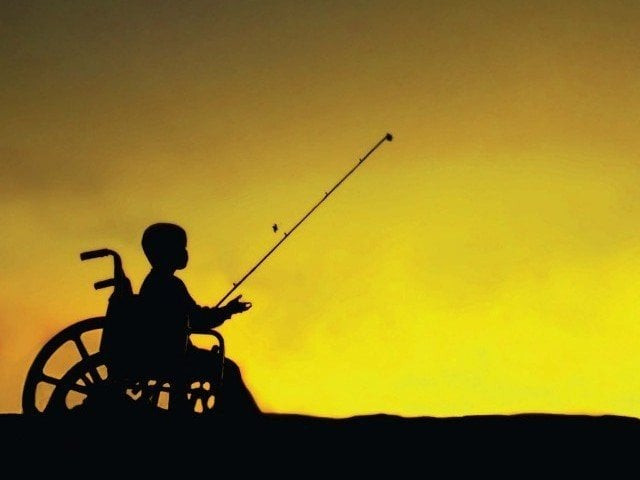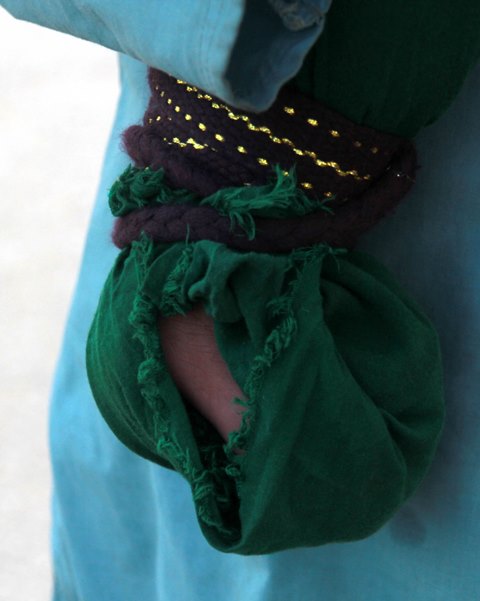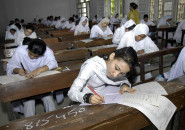Sindh's war against polio is far from over
After a gap of 20 months, two polio cases were reported in 2017 from Afghan dominated settlements

After a gap of 20 months, two polio cases were reported in 2017 from Afghan dominated settlements. PHOTO: FILE
The first case surfaced in Karachi in August after a gap of almost 20 months. The second case in 2017 was reported at the tail-end of 2017 - in December.
Though the emergence of the virus was disappointing, the efforts made by the stakeholders in 2017 were commendable and resulted in a historically low case count. The cases were reported from District East - a onetime hub of polio in the province.
In comparison, eight polio cases were reported in 2016, 12 in 2015 and 30 in 2014.
Meet the kids
Qasim Khan, a 10 month old, contracted polio in August. He was born in January, 2017 and has two older sisters. His father, Muhammad Ghani, belonged to Tora Bora in Afghanistan and was displaced during the United States-led operation in his home country.
Currently living in Sher Khan Village near Saadi Town, Ghani sells clothes on motorcycle.
Vaccination : Polio campaign targets 1.7m children
Clutching Qasim on his lap, Ghani told The Express Tribune that they found out his son had contracted polio when he experienced high-grade fever coupled with diarrhoea and vomiting. "I took my child to a hospital when after a week the fever was not coming down. The hospital took stool samples and later revealed that my son had to suffer a lifetime disability due to poliovirus," he lamented.
 Six month old Zabiullah contracted polio after his parents refused to have him vaccinated. PHOTO: ATHAR KHAN/EXPRESS
Six month old Zabiullah contracted polio after his parents refused to have him vaccinated. PHOTO: ATHAR KHAN/EXPRESS"Now we have come to know the significance of the polio vaccination as my only son is affected with a life altering disease," Ghani said dismally. He admitted that they had missed a few polio vaccinations when the campaigns were being run in the area.
According to Shahmir Khan, a native Pashtun hailing from Zhob and a resident of the nearby Sher Khan Goth, teams coming to administer polio drops in Afghan dominated areas face a lot of challenges. "It's a sad state of affairs that children as young as five months old have to suffer the effects of the poliovirus because of negligence of their parents."
He grimly told The Express Tribune that although a majority of the residents in the settlements have been sensitised about contracting polio and its lifelong effects on their children, some still believe it will harm their children and make them impotent.
"If the West wanted to reduce the population of Muslims through the anti-polio vaccination, which is a common misconception among people, then they could give it to us in any other form of medicine or in other eatables that we consume on a daily basis rather than wasting billions of dollars on polio vaccinations and its costly campaigns," Khan explained pragmatically.
The other polio case reported was of six month old Zabiullah. His case was reported in early December.
Eradicating polio: Need to boost efforts in winter
The infant is a resident of union council 4 Gadap and his family is also from Afghanistan.
After refusing to get their infant vaccinated, Zabiullah's parents have begun taking him to the shrine of Younis Baba near Safoora Goth. His parents were advised that this was the best course of action by their well-meaning neighbours.
"The women in our area told my wife to take my child for a ziarat [shrine] for three consecutive days. It's the second day today and I have to visit tomorrow as well since this might help my son recover," said Sakhi, the boy's father. Disheartened by this turn of events, Sakhi's job as a rag-picker has suffered due to his son's condition.
A green coloured cloth and a black thread wrapped around Zabiullah's legs were evidence of his family's desperate attempts to save the boy from the incurable disease.
 Zabiullah's parents have been visiting shrines every day to find a cure for the crippling disease. PHOTO: ATHAR KHAN/EXPRESS
Zabiullah's parents have been visiting shrines every day to find a cure for the crippling disease. PHOTO: ATHAR KHAN/EXPRESSFormer district health officer of District East, Dr Syed Ali Anjum, who has recently been transferred from his post, said that both the cases had a history of refusals. According to him, they had taken a few doses of polio vaccination but were not regular participants in the polio campaigns. "As a result, [the boys'] bodies could not fight the poliovirus due to the lack of required immunity," Dr Anjum lamented.
It's not over
This disappointing turn of events has strengthened administration's resolve to not tolerate cases of refusals. "We would make Karachi polio-free and an example for others to follow in eradicating the poliovirus," said Karachi Commissioner Ejaz Ahmed Khan, adding that refusals endanger the futures of Pakistan's next generation.
Pakistan and Afghanistan are the only countries in the world with reported cases of polio. In 2017, a total eight cases were reported in Pakistan - one each from Punjab, Khyber-Pakhtunkhwa and Gilgit-Baltistan, three from Balochistan and two from Sindh.



















COMMENTS
Comments are moderated and generally will be posted if they are on-topic and not abusive.
For more information, please see our Comments FAQ